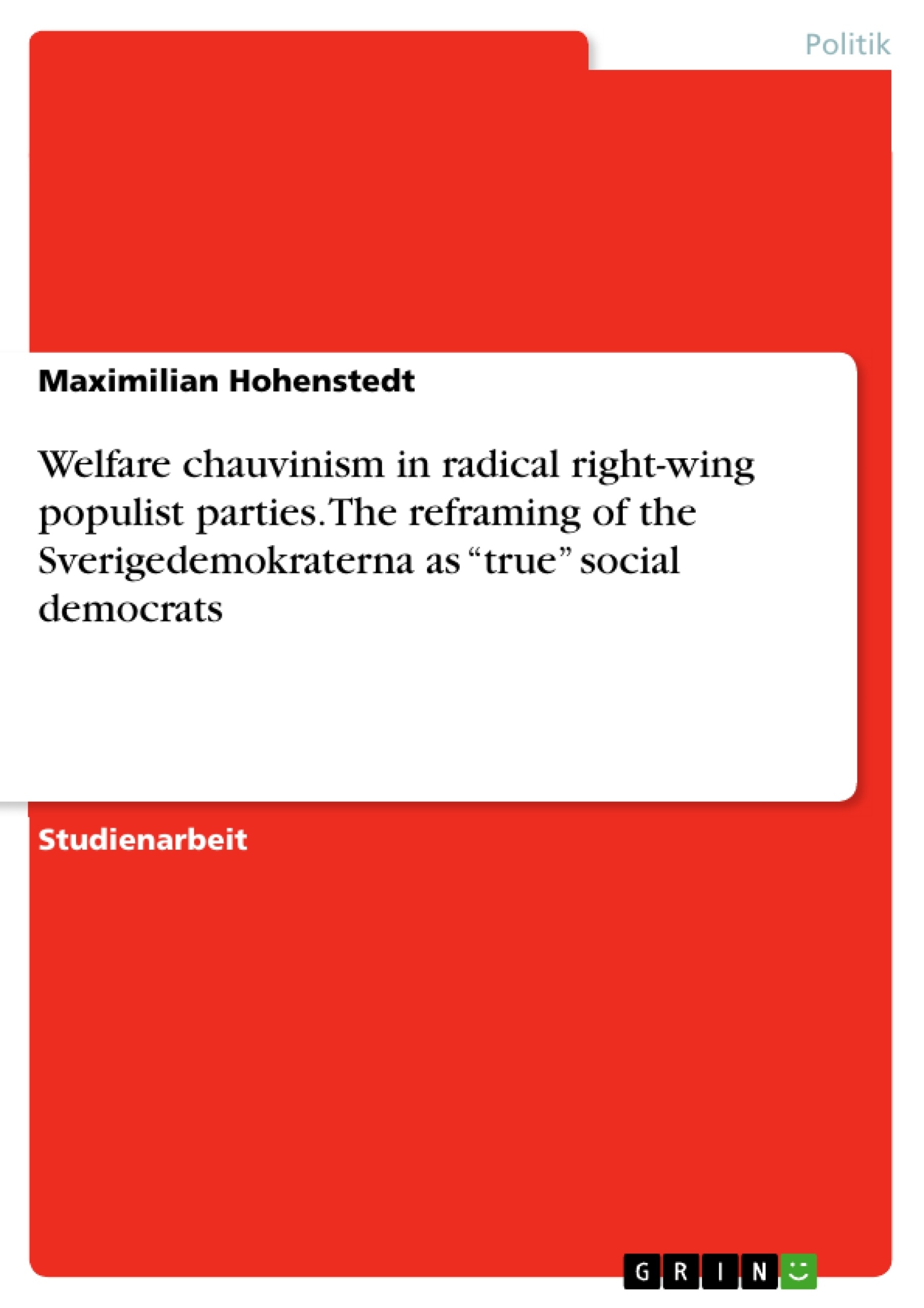It will be the aim of this written assignment to work out the reasons for the changed political landscape in Sweden, namely the success of the Sverigedemokraterna (SD) and to show, how welfare chauvinism as strategy of the SD helped to establish this radical right-wing party as electable alternative to the established parties. This will be the question, this work will answer: Does the SD owe their electoral success to the introduction of a social agenda, based on the concept of folkhem (the people’s home or Volksheim) to use welfare chauvinism to reach a broader electorate?
To answer this question, first, there will be an examination of the concepts of populism, radical right-wing populism, welfare chauvinism and a short description of the SD in Sweden. Then, several possible reasons for the electoral success of the SD will be checked, namely the financial crisis of 2008 and its social impacts, the new social narrative of the SD, focusing the concept of welfare chauvinism, anti-establishment discourses in Sweden and the salience of sociocultural elements like immigration, islamophobia and xenophobia. After this, the results will get concluded and added with a short outlook to further research.
In the political science debates dealing with populism, the question of the rise of the right-wing populism is linked with the question whether this is owed the failure of conservative parties or the social democracy in Europe. Due to the thesis of this work, that welfare chauvinism is the main reason for the success of the SD in Sweden, it will focus more the failure of the Sveriges socialdemokratiska arbetareparti (SAP) to maintain its traditional core electorate, which led to the raise of the SD. The social relevance of this work lies on its dealing with the question of why radical right-wing populism is arising even in established and economically stable democratic welfare-states and how established parties has to deal with this.
Inhaltsverzeichnis
- Introduction
- I) Analysis grid of populism
- 1) Populism
- 2) Populistic style and communication
- 3) Populist entrepreneurship
- 4) Populist organization as movement
- 5) Radical right-wing populism
- 6) Welfare chauvinism as host ideology of right-wing populism
- II) The Swedish case: welfare chauvinism as role model for success?
- 1) The Sverigedemokraterna in Sweden
- 2) Socioeconomic issues
- 3) Class voting in Sweden.
- 4) Trust in institutions .......
- 5) The financial crisis of 2008 and its impacts on the Swedish economy
- 6) Sociocultural issues and their salience in public opinion.
- 7) Anti-immigration policy under the banner of folkhem
- 8) Crisis? What crisis? Framing of a welfare-crisis by the Sverigedemokraterna..\li>
- 9) Self-framing of Sverigedemokraterna as “true” social democrats
- Conclusion and outlook.........
Zielsetzung und Themenschwerpunkte
Die vorliegende Arbeit untersucht die Gründe für den Aufstieg der Sverigedemokraterna (SD) in Schweden und analysiert, wie der Einsatz von Wohlfahrtschauvinismus als Strategie der SD dazu beigetragen hat, diese rechtspopulistische Partei als wählbare Alternative zu etablierten Parteien zu etablieren. Die zentrale Frage ist, ob der Wahlerfolg der SD auf die Einführung einer sozialen Agenda zurückzuführen ist, die auf dem Konzept des „Folkhem“ (Volksheim) basiert und Wohlfahrtschauvinismus nutzt, um ein breiteres Wählerpublikum zu erreichen.
- Das Konzept des Populismus und des Rechtspopulismus
- Die Rolle des Wohlfahrtschauvinismus im Rahmen des Rechtspopulismus
- Der Aufstieg der Sverigedemokraterna in Schweden
- Der Einfluss der Finanzkrise von 2008 auf die schwedische Politik
- Die Bedeutung soziokultureller Themen, wie Immigration, Islamophobie und Xenophobie, für den Wählerentscheid
Zusammenfassung der Kapitel
Die Arbeit beginnt mit einer Analyse des Populismuskonzepts und untersucht die verschiedenen Ausprägungen des Populismus, insbesondere den Rechtspopulismus. Dabei wird der Begriff des Wohlfahrtschauvinismus als zentrale Ideologie des Rechtspopulismus definiert. Anschließend erfolgt eine Vorstellung der Sverigedemokraterna (SD) in Schweden und ihrer Entwicklung.
Im Folgenden werden verschiedene Gründe für den Aufstieg der SD in Schweden analysiert. Dazu gehören die Auswirkungen der Finanzkrise von 2008 auf die schwedische Gesellschaft, die neuen sozialen Narrative der SD, die auf Wohlfahrtschauvinismus basieren, sowie anti-etablierte Diskurse in Schweden und die zunehmende Bedeutung soziokultureller Themen wie Immigration, Islamophobie und Xenophobie.
Schlüsselwörter
Die zentralen Schlüsselwörter der Arbeit sind Populismus, Rechtspopulismus, Wohlfahrtschauvinismus, Sverigedemokraterna, Schweden, Finanzkrise, Immigration, Islamophobie, Xenophobie, soziale Agenda, Folkhem, Volksheim, etablierte Parteien, Wahlkampfstrategie, politische Kommunikation.
Häufig gestellte Fragen
Was ist Wohlfahrtschauvinismus?
Wohlfahrtschauvinismus ist eine politische Strategie, bei der der Zugang zu Sozialleistungen auf die eigene Staatsangehörigkeit ("das eigene Volk") begrenzt werden soll, während Einwanderer davon ausgeschlossen werden.
Warum sind die Sverigedemokraterna (SD) so erfolgreich?
Ihr Erfolg basiert maßgeblich auf der Neuausrichtung als "wahre" Sozialdemokraten, die das traditionelle Konzept des "Folkhem" (Volksheim) besetzen und soziale Sicherheit mit einer strengen Anti-Immigrationspolitik verknüpfen.
Welche Rolle spielte die Finanzkrise 2008 für den Rechtspopulismus in Schweden?
Die Krise verstärkte ökonomische Ängste und das Misstrauen gegenüber etablierten Institutionen, was den SD ermöglichte, sich als Alternative für die enttäuschte Arbeiterschicht zu präsentieren.
Was bedeutet das Konzept des "Folkhem"?
Ursprünglich ein sozialdemokratisches Konzept eines solidarischen Wohlfahrtsstaates, wird es von den SD umgedeutet in ein exklusives Heim für die ethnisch schwedische Bevölkerung.
Wie reagieren etablierte Parteien auf den Aufstieg der SD?
Die Arbeit zeigt, dass etablierte Parteien oft Schwierigkeiten haben, ihre Wählerbasis zu halten, wenn rechtspopulistische Parteien soziale Themen erfolgreich mit Identitätspolitik besetzen.
- Arbeit zitieren
- Maximilian Hohenstedt (Autor:in), 2017, Welfare chauvinism in radical right-wing populist parties. The reframing of the Sverigedemokraterna as “true” social democrats, München, GRIN Verlag, https://www.grin.com/document/385734



